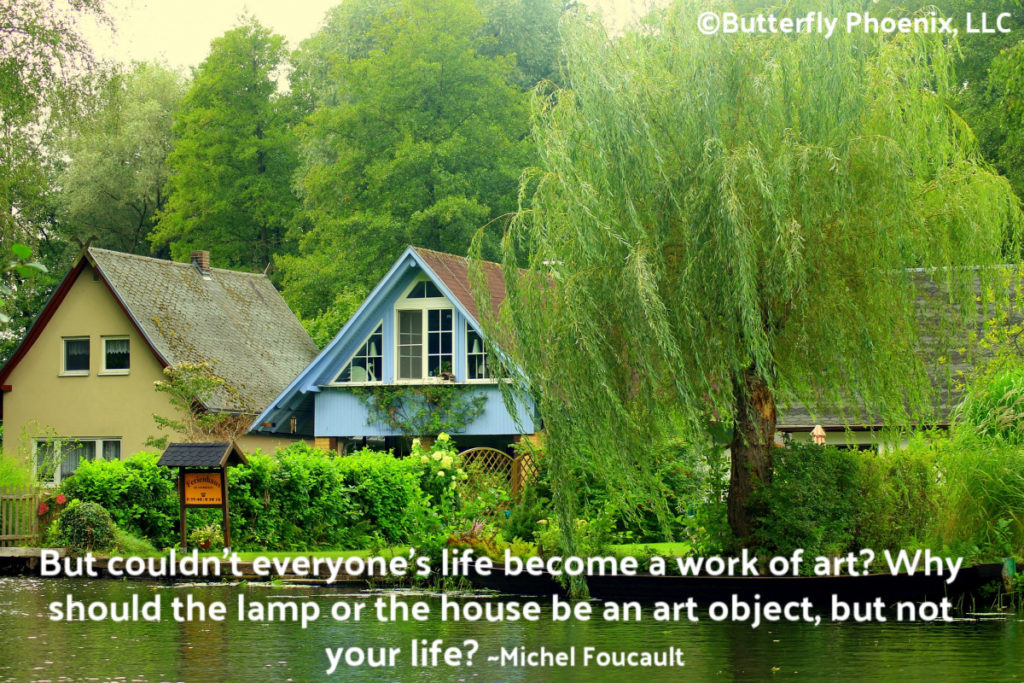Suspendisse volutpat elit nec nisi congue tristique eu at velit urabitur pharetra exnon ullamcorper condimentum.
Being Before Doing
Have Any Question?


You must become that which you want to be first and let the world follow in your tracks…. Your world faithfully and accurately reflects, not what you have put in an order for, not what you have correctly and clearly asked for, but the person you are! * ~Genevieve Davis
Every great work is just that: work, that someone did. Someone took an action which produced a result. In our scientifically oriented, mechanistic culture, nothing happens without an introduction of work into a system. Without work, a system by nature moves toward entropy – disorder and chaos.
Even in the art world, masterpieces and not-so-masterful pieces are called “works of art”. Like everything else, art is something we do.
Nothing happens until someone moves something.
This scientific view, this cause-and-effect perspective, is the perceptual framework that defines western civilization. It’s a good and a valid perceptual framework, but like any framework, it can only show us part of the entire reality.
Our mistake arises when we see part of the picture but believe we’re seeing the whole.
The disconnect between “western” and “eastern” medicine, science, and philosophy stems partially from this clash of perceptual frameworks. In the western viewpoint, the whole is the sum of its discrete parts and is defined by their specific functions; the eastern perception is that everything is a reflection of the whole and contains the whole within itself.
Even in the west, we acknowledge the idea that the whole can be greater than the sum of its parts.
Stepping beyond our perceptual frameworks….

Perhaps we should step back and look at our ideas of working, of doing, because maybe we’re putting the cart before the horse; maybe we’re looking at the end result of a process but thinking that the result sprang fully formed from an isolated action or set of actions.
So let’s look at producing a work of art so we can see the process behind the result; that will equip us to apply it in useful ways to the other areas of our lives.
How to create a masterpiece in three easy steps….
If we’re going to paint a picture of a vase of flowers, we first have to get a vase of flowers, whether that’s an actual vase with flowers in it, or a picture of a vase with flowers, or a memory of one, or even an imagined picture of one. Then we just pick up a paintbrush and transfer that image onto a canvas or a building or watercolor paper.
If we sit down with a musical instrument, we need a piece of music to play on it. We get the sheet music, or a recording of a piece of music, or our memory of a piece of music, or an imagined piece of music. Then we just play that piece of music.
“But,” you object, “I don’t know how to paint a picture or play a musical instrument!”
The how is the process: not the mechanistic, step-by-step, painstaking instruction to replicate the object in a new medium. Not at all. That’s part of the work that produces the end result, the end of the process.
The process begins not with working in a medium to produce a result, but with becoming a person who can and will create that artwork.

Art isn’t created in a vacuum.
It’s created in the soul, the heart, the imagination of the artist.
You must be what you want to create first. If you want to create something beautiful, you must have a beautiful soul, one that loves and is attracted to beauty – not shallow judging of physical good looks, but the deep appreciation of beauty within the object of your vision.
If you want to create art that promotes social justice, it must first live in your soul.
If you want to create art that demonstrates the beauty or the power or the majesty of nature, you must first love, appreciate, and understand it in the deep places of your heart.
Notice there’s no mention of talent.
Talent usually means that someone can be good at something more easily than others can. The rest of us have to work harder to be just as good. But there’s almost nothing that can’t be taught to someone who wants to learn, and once she masters the techniques, she immerses herself into the expression of passion and emotion and gratitude, and that person can produce art that moves people, art that means something.
The person expresses the soul, and what emerges from that expression is art.
The same holds true in every area of our lives. When we express who we are, what emerges from that expression is our life. Our experiences reflect – at least to an extent – the person we are, and the beliefs we hold. Of course, the people around us and our circumstances affect the kind of life we live, too: if we can barely feed our families, then we likely won’t be making scientific breakthroughs or writing classic literature.
Nevertheless, despite bad circumstances that may be beyond our control, some manage to have homes filled with happiness, children who feel understood and appreciated, and friends who seek them out.
Yet others, perhaps even those in fairly good circumstances, have rather average lives. These people have chosen, for whatever reason, not to be extraordinary, not to seek beauty, not to understand themselves. They have chosen to live by default, responding to every situation but never creating, living their lives on autopilot. Maybe this even describes you.

What would your life look like if you chose to be extraordinary?
What makes your soul sing? Who could you become to give voice to that song? How could you give expression to the beauty and depth and passion in your soul? Where is the inspiration?
Life is not doing. Life is becoming. Being is enough, and yet being isn’t static. It’s changing, flowing, charging, calming.
Being is becoming is being.
Be the voice for the voiceless, if that sets your heart on fire. Express beauty – or pain or anger or social injustice or any other important message through a medium that appeals to you. Change the world, or change your world: it can only happen through being.
Be the kind of person people want to be with, the kind of person who lives a message, the kind of person whose life deeply touches other people.
Be your passion.

Being gives life meaning and purpose . . . makes a life well lived . . . makes a difference.
* Davis, Genevieve. Becoming Magic: A Course in Manifesting an Exceptional Life (Book 1) (pp. 62-64). Kindle Edition.


